FRALIN BIOMEDICAL RESEARCH INSTITUTE ESTABLISHES A D.C. PRESENCE
FRALIN BIOMEDICAL RESEARCH INSTITUTE ESTABLISHES A D.C. PRESENCE
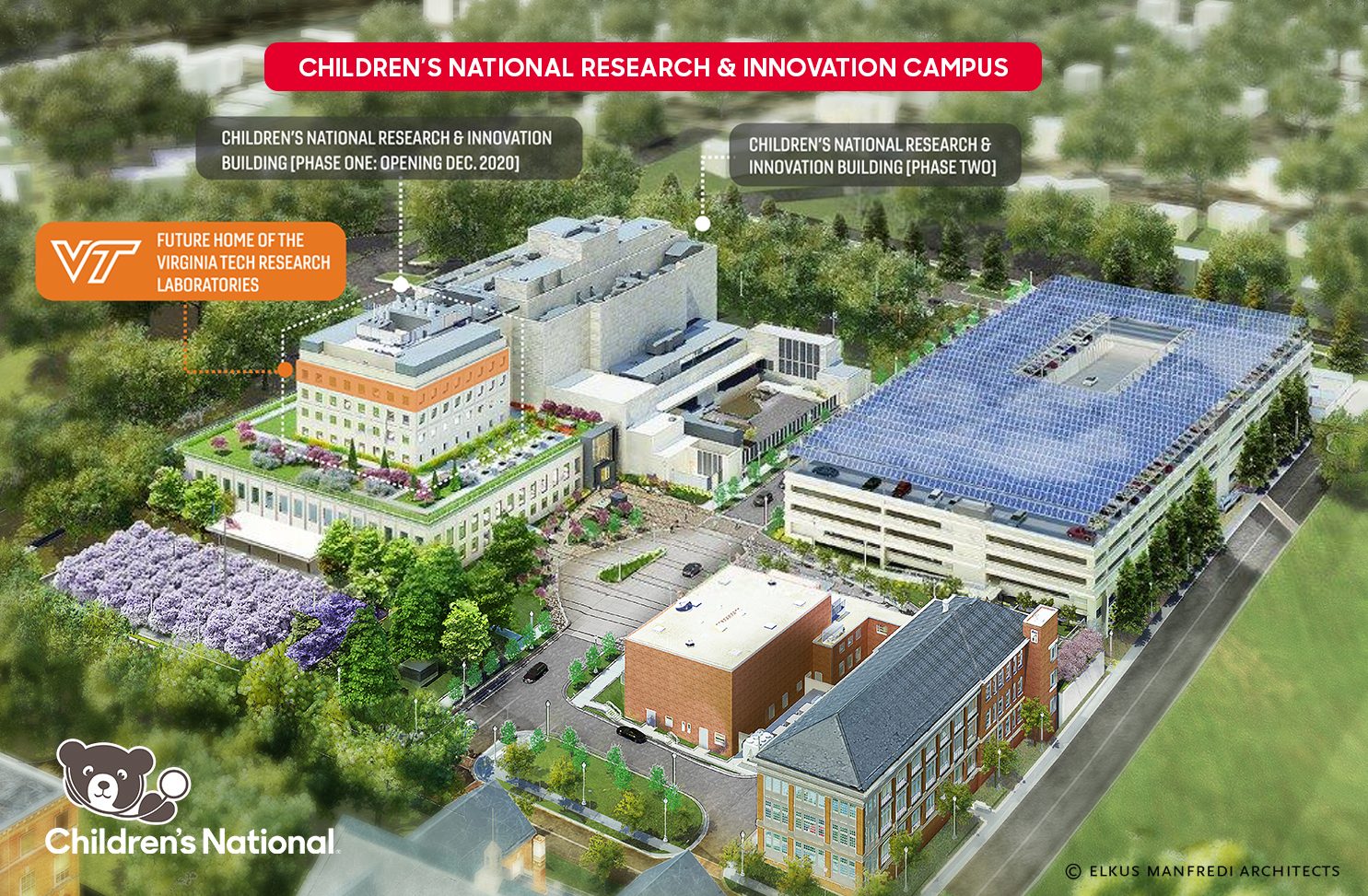
PEDIATRIC PARTNERSHIP: Children’s National Hospital and Virginia Tech will build a research facility at the new Children’s National Research & Innovation Campus.
Children’s National Hospital and Virginia Tech announced in November plans for a formal partnership that will include the construction of a 12,000-square-foot Virginia Tech biomedical research facility within a new Children’s National Research & Innovation Campus.
The campus is an expansion of Children’s National, which is located on a nearly 12-acre portion of the former Walter Reed Army Medical Center in Washington, D.C. It is set to open its first phase in December 2020.
The new collaboration will create an innovation campus focused on pediatric research.
Faculty from the Children’s National Research Institute and the Fralin Biomedical Research Institute at VTC in Roanoke have worked together for more than a decade, already resulting in shared research grants, collaborative publications, and shared intellectual property. Together, the two institutions will expand their collaborations to develop new drugs, medical devices, software applications, and other novel treatments for cancer, rare diseases, and other disorders.
LUIZ DASILVA NAMED INAUGURAL EXECUTIVE DIRECTOR FOR COMMONWEALTH CYBER INITIATIVE
LUIZ DASILVA NAMED INAUGURAL EXECUTIVE DIRECTOR FOR COMMONWEALTH CYBER INITIATIVE
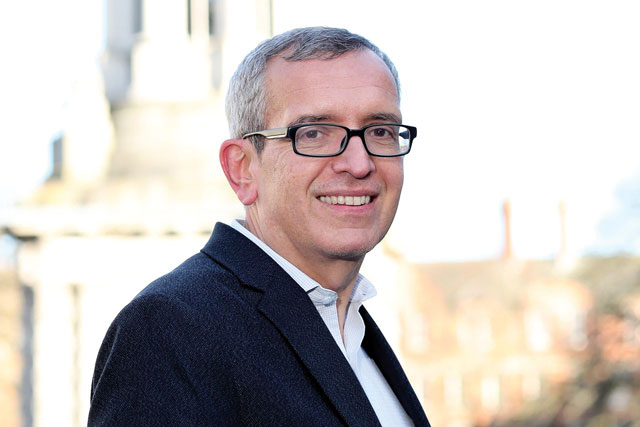
Luiz A. DaSilva
Luiz A. Dasilva, professor of telecommunications at Trinity College in Dublin, Ireland, and director of CONNECT, the Science Foundation Ireland Centre for Future Communications and Networks, will join the Commonwealth Cyber Initiative in March 2020 as its inaugural executive director.
At CCI, DaSilva will lead a network of higher education and industry experts to build an ecosystem of cyber-related research, education, and engagement that will position Virginia as a world leader in cybersecurity and cyber-physical systems.
With partnership of both higher education institutions and industry, CCI was established in the 2018-20 Virginia budget, which will invest $20 million annually from 2020 and beyond.
DaSilva comes to CCI with 21 years of experience in academia, including 17 years in the Commonwealth of Virginia as a professor at Virginia Tech.
STUDENTS LEARN BANKING THROUGH LOANS WITH REAL MONEY
STUDENTS LEARN BANKING THROUGH LOANS WITH REAL MONEY
Virginia Tech students who study finance are investing real money while acquiring the skills of commercial banking loan officers.
Credit Corps is a new program offered through the Pamplin College of Business that allows students, using funds from the Virginia Tech Foundation, to participate in actual loans with bank partners.
The unique program is aimed at enhancing students’ skills in credit risk analysis, business analytics, teamwork, and portfolio management.
“Credit Corps will prepare students for jobs and careers across a wide range of finance career paths and offer financial firms a pipeline of credit-savvy recruits with hands-on experience,” said finance professor George Morgan, who led efforts to develop the program.
At the same time, the program seeks to earn a competitive return for the Virginia Tech Foundation, Morgan said. The foundation is committing $2 million over four years, or $500,000 a year, to sponsor the program.
The students’ responsibilities include reviewing financial statements, interviewing management at the borrowing companies, identifying risk issues, and managing fund inflows and outflows as repayments are made and new loans considered.
Atlantic Union Bank has signed on as the program’s inaugural partner, providing loans that Credit Corps may consider for participation.
The plan for Credit Corps is to start small, Morgan said, with one team of a half-dozen students in the first year and to grow within two years to 20-plus students working in several “deal teams.” Longer-term, the goal is to double the current number of finance graduates with at least a year of hands-on experience in risk management and banking.
GIVENS NAMED DEAN OF VIRGINIA-MARYLAND COLLEGE OF VETERINARY MEDICINE
GIVENS NAMED DEAN OF VIRGINIA-MARYLAND COLLEGE OF VETERINARY MEDICINE
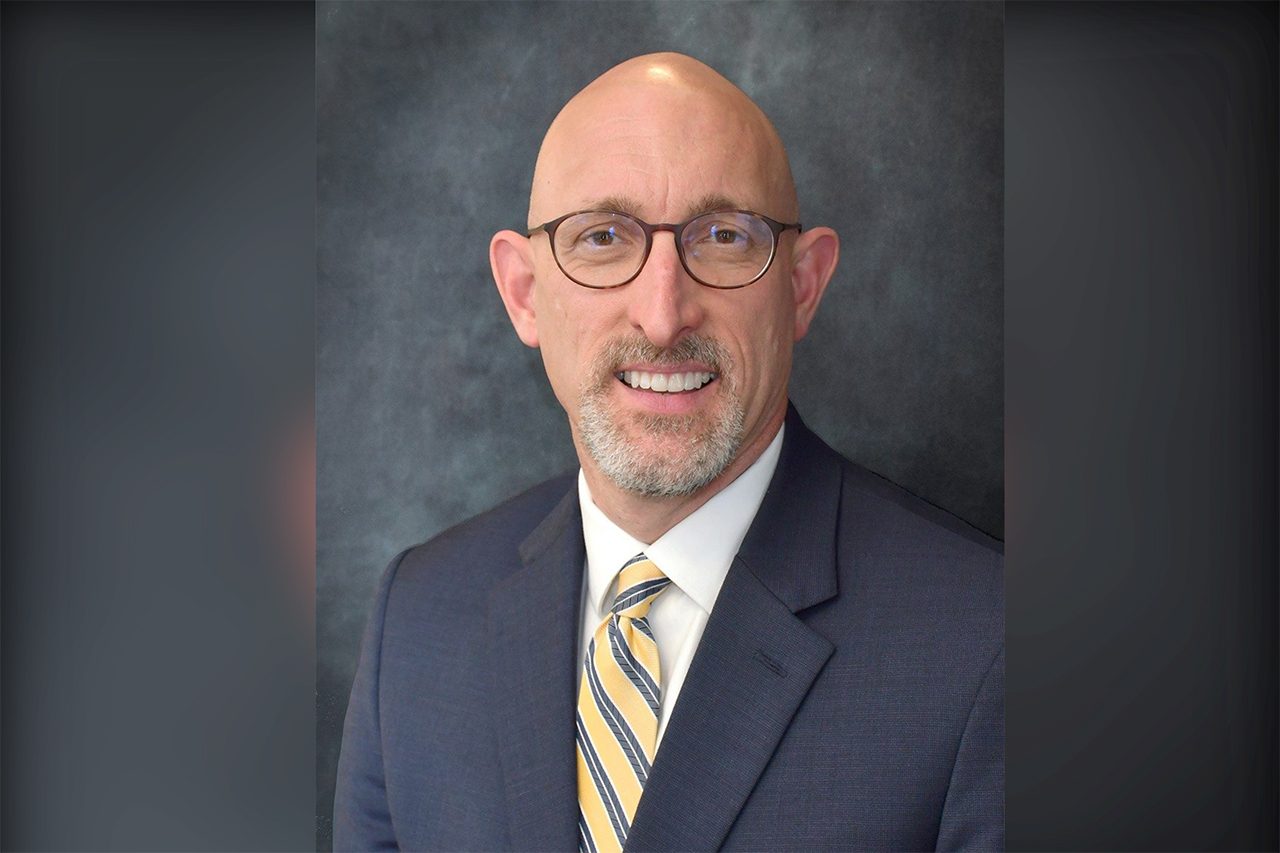
M. Daniel Givens
M. Daniel Givens, a veterinarian, researcher, and educator, is the new dean of the Virginia-Maryland College of Veterinary Medicine at Virginia Tech, effective June 1.
Givens currently serves as the associate dean for academic affairs in the College of Veterinary Medicine at Auburn University, where he is also a professor in the Department of Pathobiology. He will succeed Gregory B. Daniel, who has served as interim dean of the college since 2017 and will return to his faculty position in the Department of Small Animal Clinical Sciences.
Since joining the Auburn University faculty in 2000, Givens, a diplomate of both the American College of Veterinary Microbiologists (virology specialty) and the American College of Theriogenologists, has served in various roles, including acting head of the Department of Pathobiology and interim associate dean for academic affairs.
He completed undergraduate studies at Western Kentucky University and received a D.V.M. and a Ph.D. in biomedical sciences, both with academic distinction, from Auburn University.
MISS AMERICA SHINES SPOTLIGHT ON SCIENCE
MISS AMERICA SHINES SPOTLIGHT ON SCIENCE
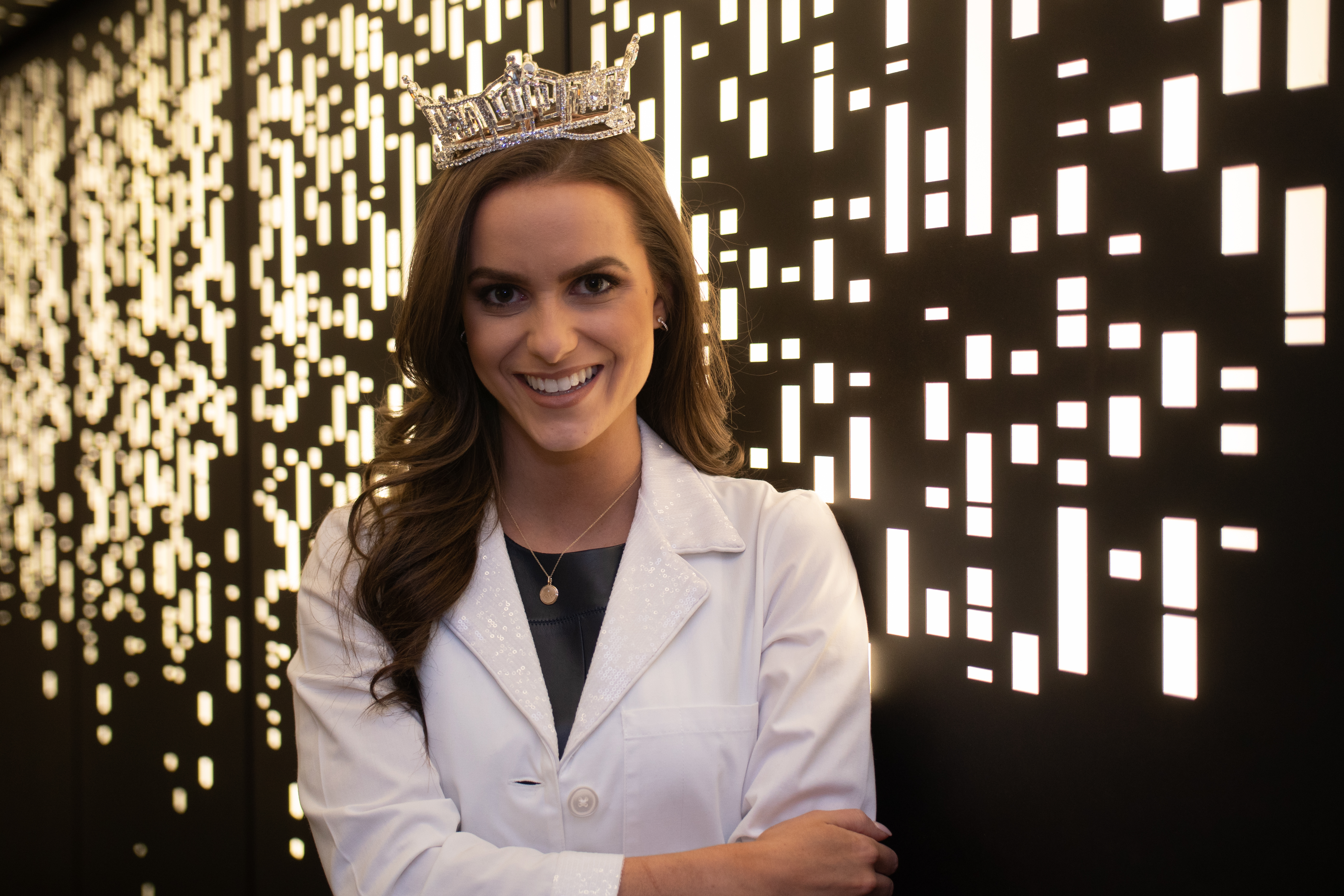
SCIENCE QUEEN: Camille Schrier ’18, who performed a science experiment as her talent, was crowned Miss America on Dec. 19, 2019.
Camille Schrier made history in December as the second Virginia Tech alumna ever to be crowned Miss America.
But her victory was historic on another level. The 2018 Virginia Tech graduate, who double majored in systems biology and biochemistry, was the first Miss America winner to perform a science experiment as her talent. It was the same experiment she used in winning the title of Miss Virginia in the summer of 2019. Currently, she is enrolled in the doctoraal program at Virginia Commonwealth University’s School of Pharmacy.
In November, Schrier returned to Blacksburg and recreated the science experiment demo on stage at the Moss Arts Center as part of the Nutshell Games, sponsored by the Virginia Tech Center for Communicating Science. Earlier in the day, she appeared at the Virginia Tech Science Festival, where she delighted scores of attendees by creating a faux cloud using liquid nitrogen and boiling water.
Schrier’s Miss America victory will inspire young girls to explore STEM opportunities, said Virginia Tech College of Science Dean Sally C. Morton.
“We are delighted to see a Virginia Tech science alumna shine on the national stage,” Morton said. “And we’re even more thrilled that she is using her success to showcase the value of STEM education for kids and as a catalyst to encourage young girls to study science and do science.”
Kylene Barker, a 1978 Virginia Tech graduate, is the only other Hokie alumna to be crowned Miss America. She won the competition in 1978.
STUDENTS LAUNCH ‘BIG LICK OF SCIENCE’ PODCAST WITH MICROGRANT
STUDENTS LAUNCH ‘BIG LICK OF SCIENCE’ PODCAST WITH MICROGRANT
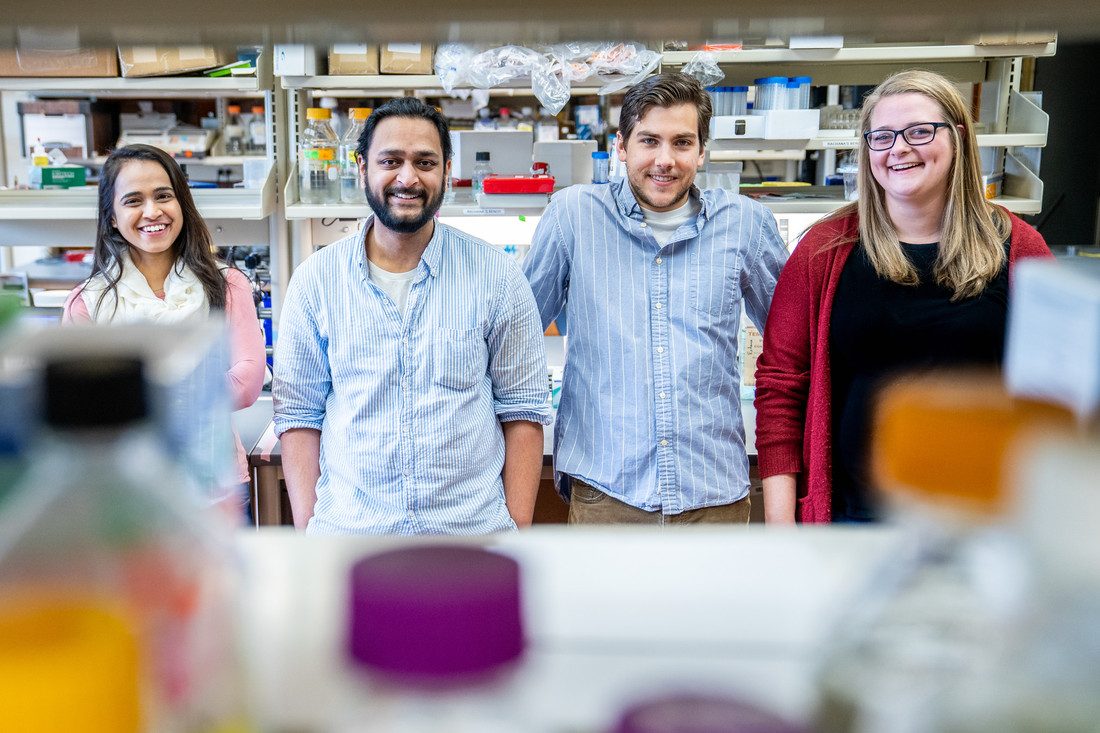
What is DNA and how does it shape our traits? How do our brains store memories? These are some of the questions that a new Roanoke-based science podcast, "Big Lick of Science," examines.
Produced by Virginia Tech translational biology, medicine, and health (TBMH) graduate students training at the Fralin Biomedical Research Institute at VTC, each episode of "Big Lick of Science" explores a unique aspect of biomedical research and its relevance to life and health.
To support the podcast’s roll out, the VTC Student Outreach Program recently received a $1,500 one-year 2019 Civic Engagement Microgrant from Research!America. These microgrants help scientists improve public awareness of their research.
“‘Big Lick of Science’ is all about connecting the local community to local scientists working at the research institute,” said Rachana Deven Somaiya, podcast co-host, neuroscientist, and third-year TBMH graduate student.
INDIA-BASED CERTIFICATE PROGRAM IN BUSINESS ANALYTICS TEACHES BIG DATA SKILLS
INDIA-BASED CERTIFICATE PROGRAM IN BUSINESS ANALYTICS TEACHES BIG DATA SKILLS
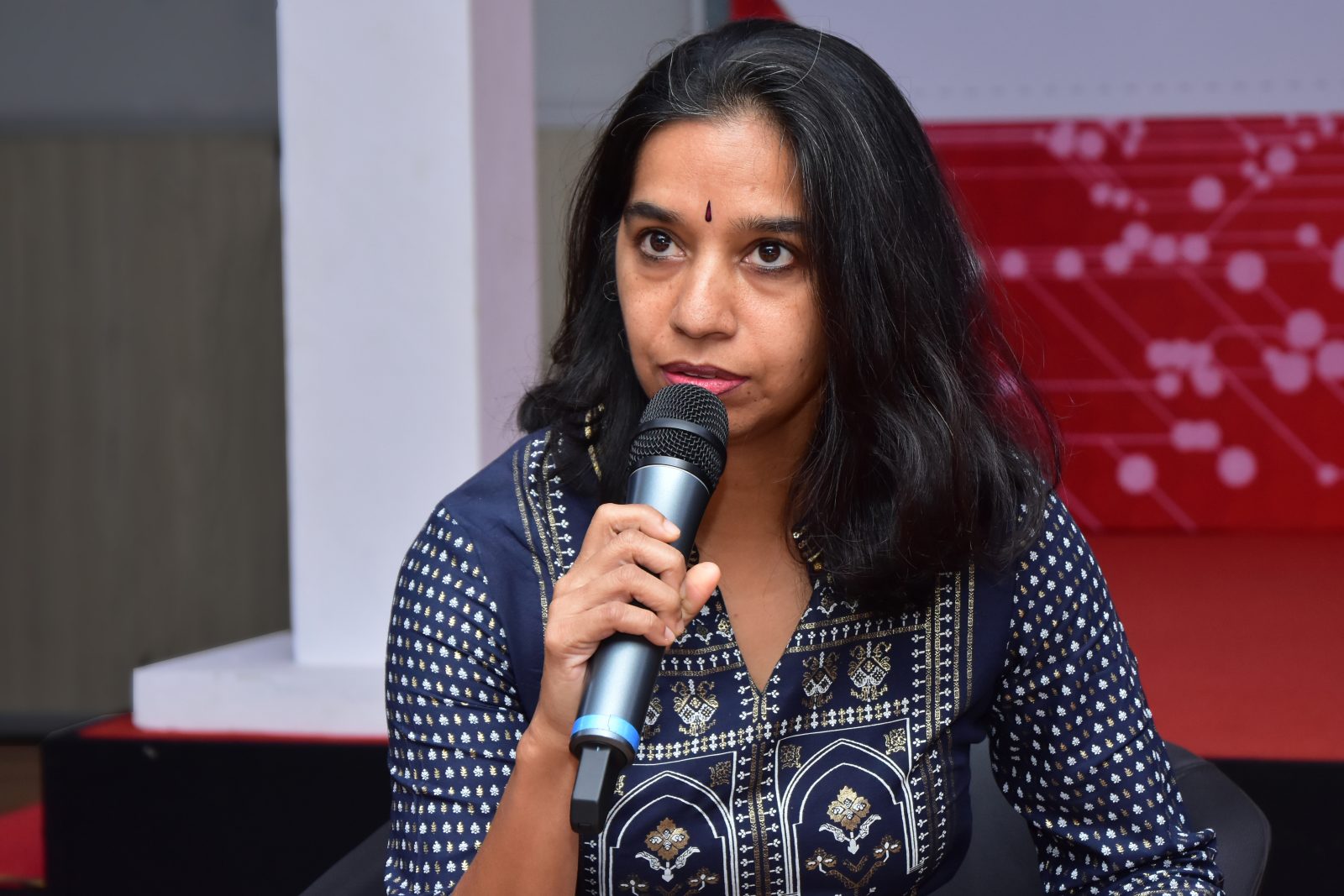
Radhica Kanniganti
Radhica Kanniganti works for a startup company in India, home to some of the world’s most-polluted cities. She hopes to improve lives through her work as an environmental engineer for Bangalore-based Devic Earth, which is testing a device that reduces air pollution by employing radio waves.
The job, which requires analyses of wind speeds, rainfall, temperatures, and more, led Kanniganti to Virginia Tech’s new India-based noncredit certificate program in business analytics, where she was one of 14 students who received a certificate in business analytics and artificial intelligence in the program’s first graduation ceremony in November in Chennai, home of the Virginia Tech, India site.
“I needed to master the tools of big data,” Kanniganti said.
The certificate program was designed for people like Kanniganti, who lack technical computer-programming backgrounds yet need to master data tools. The business analytics program—spearheaded by Guru Ghosh, vice president for Outreach and International Affairs—is Virginia Tech’s first international noncredit certificate.
PROFESSOR’S RESEARCH REVEALS INFORMATION ABOUT ELUSIVE WILD CATS
PROFESSOR’S RESEARCH REVEALS INFORMATION ABOUT ELUSIVE WILD CATS
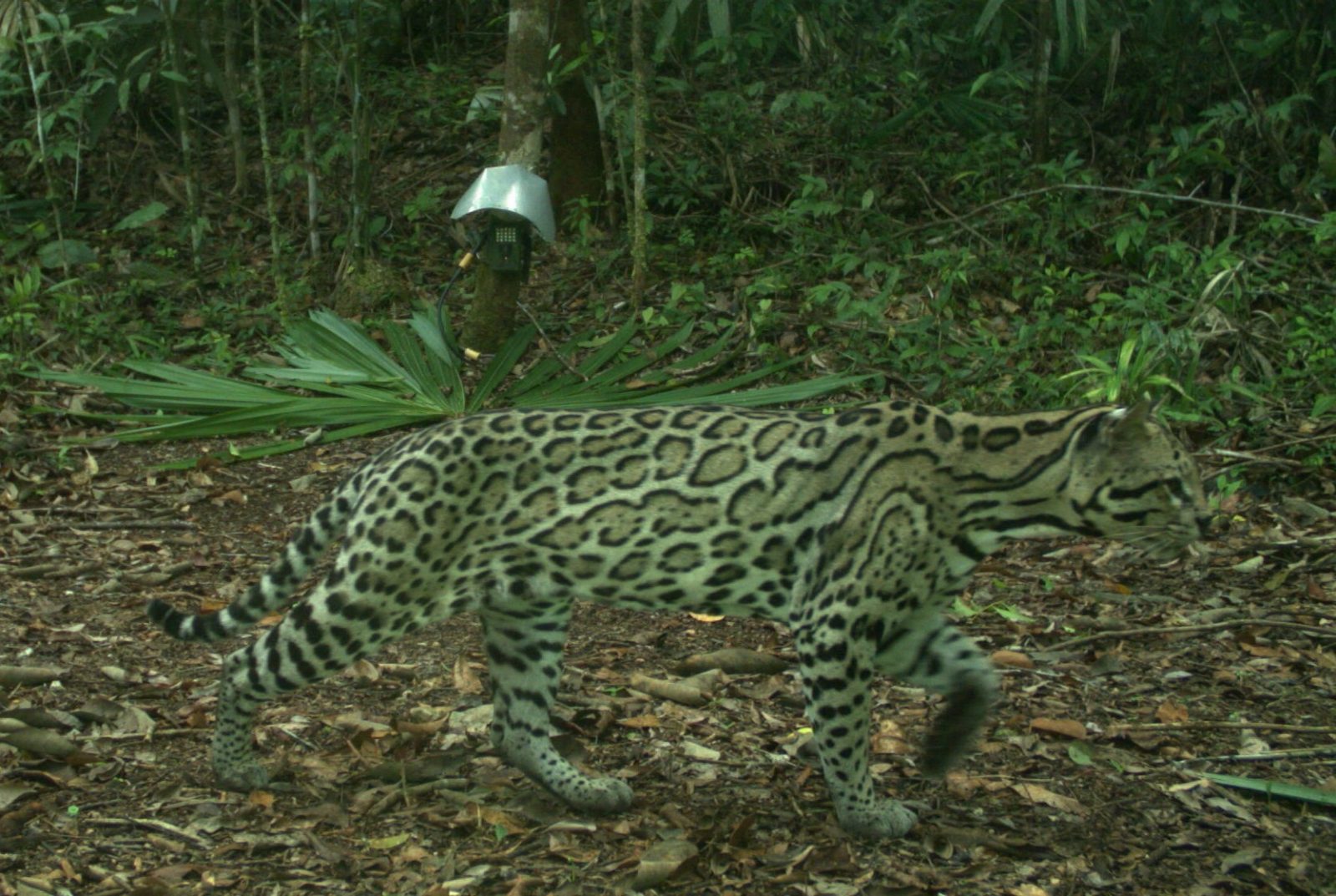
IN THE WILD: Professor Marcella Kelly has spent the past 15 years tracking predatory ocelots and jaguars using remote sensor cameras.
It is night in a Central American pine forest, and an ocelot is following a game trail. The predatory wild cat passes between two remotely triggered infrared cameras set knee-height off the ground. The cameras flash simultaneously, startling the animal and momentarily illuminating the forest.
Professor Marcella Kelly, of the College of Natural Resources and Environment, has spent the past 15 years tracking the movements of predatory ocelots and jaguars using remote sensor cameras. Now her research, one of the longest continuous studies of wild cat populations in the world, is giving scientists new insights into the range, population sizes, and migratory habits of Central American wild cats.
Kelly and Christopher Satter, a doctoral student in Virginia Tech’s Department of Fish and Wildlife Conservation, have collaborated with other researchers to publish two papers utilizing this ocelot data. A paper on population densities in Belize was published in the Wildlife Society’s Journal of Wildlife Management, while another on the use of spatial capture-recapture models to measure sex-specific population dynamics appeared in the journal Ecosphere.
Kelly’s passion for researching wild cats started at the University of California-Davis, where she did her doctoral research identifying individual cheetahs from photographs in Tanzania.
“We put our efforts into designing effective methods for using cameras to measure wild populations that are now being taught everywhere,” Kelly said. “If you’re going to survey for forested animals, you’ll follow procedures partly developed in my lab.”
NEW CHILDHOOD PRE-EDUCATION MAJOR AIMS TO SET GOLD STANDARD FOR CHILD CARE
NEW CHILDHOOD PRE-EDUCATION MAJOR AIMS TO SET GOLD STANDARD FOR CHILD CARE
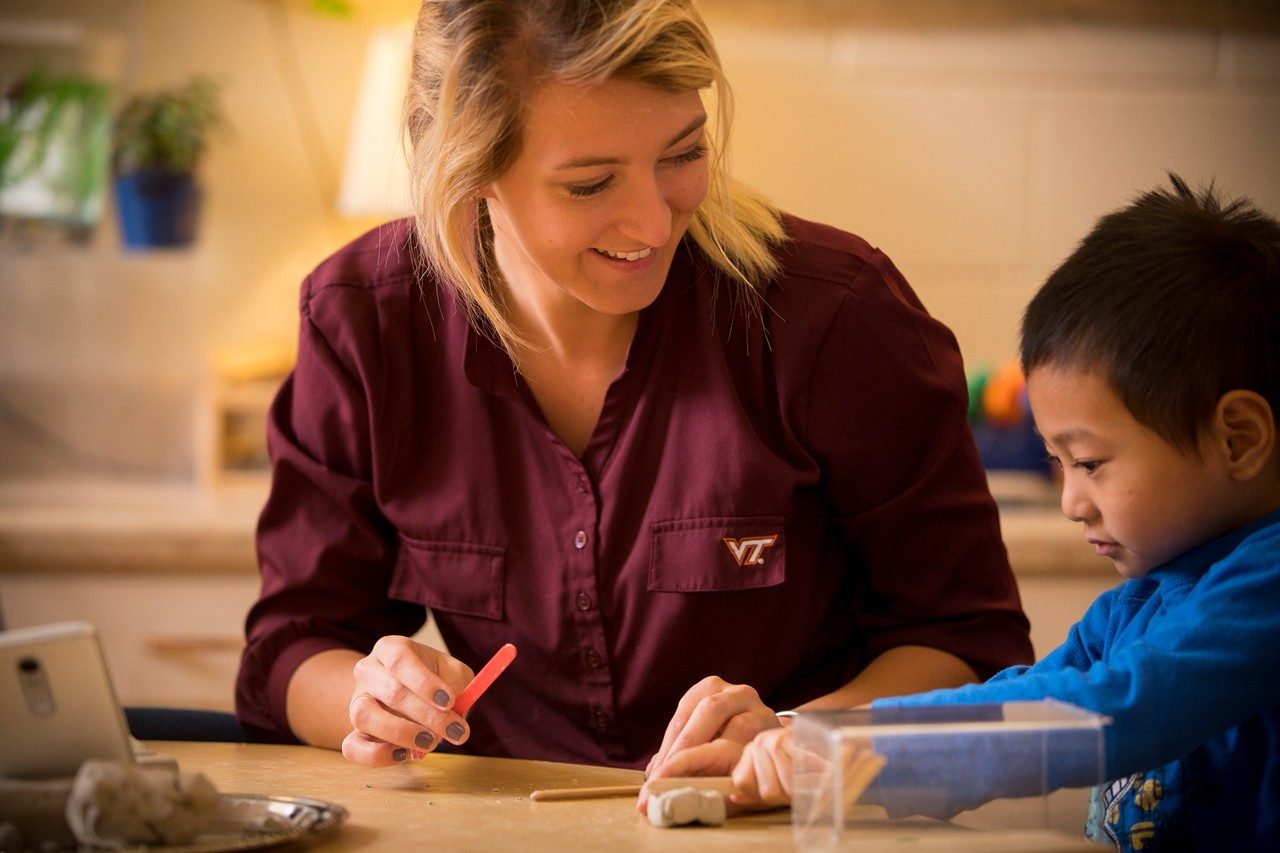
GOLD STAR: Virginia Tech alumna Emily Phillips works with a child at the Virginia Tech Child Development Center for Learning and Research.
A new major at Virginia Tech will provide a valuable resource in support of Gov. Ralph Northam’s plans to increase early childhood education for all Virginians.
The childhood pre-education major, based in the Department of Human Development and Family Science, will provide students with a strong foundation to excel as early childhood educators as well as in occupations such as counselors, social workers, therapists, and pediatricians that provide emotional support to children.
April Few-Demo, professor and head of the department, said the new major focuses on understanding not only physical child development, but also how family environments affect children. Family dynamics and units are diverse, she said, and how they interact within society has a profound effect on healthy brain development, learning potential, academic success, and future access to resources.
“We’re not just teaching students how to teach,” Few-Demo said. “We’re teaching them to understand the whole child and to know that children do not exist on an island; they exist within a family system.”
STUDENT ENTREPRENEURS SHOWCASE DESKTOP ROBOTICS STARTUP
STUDENT ENTREPRENEURS SHOWCASE DESKTOP ROBOTICS STARTUP
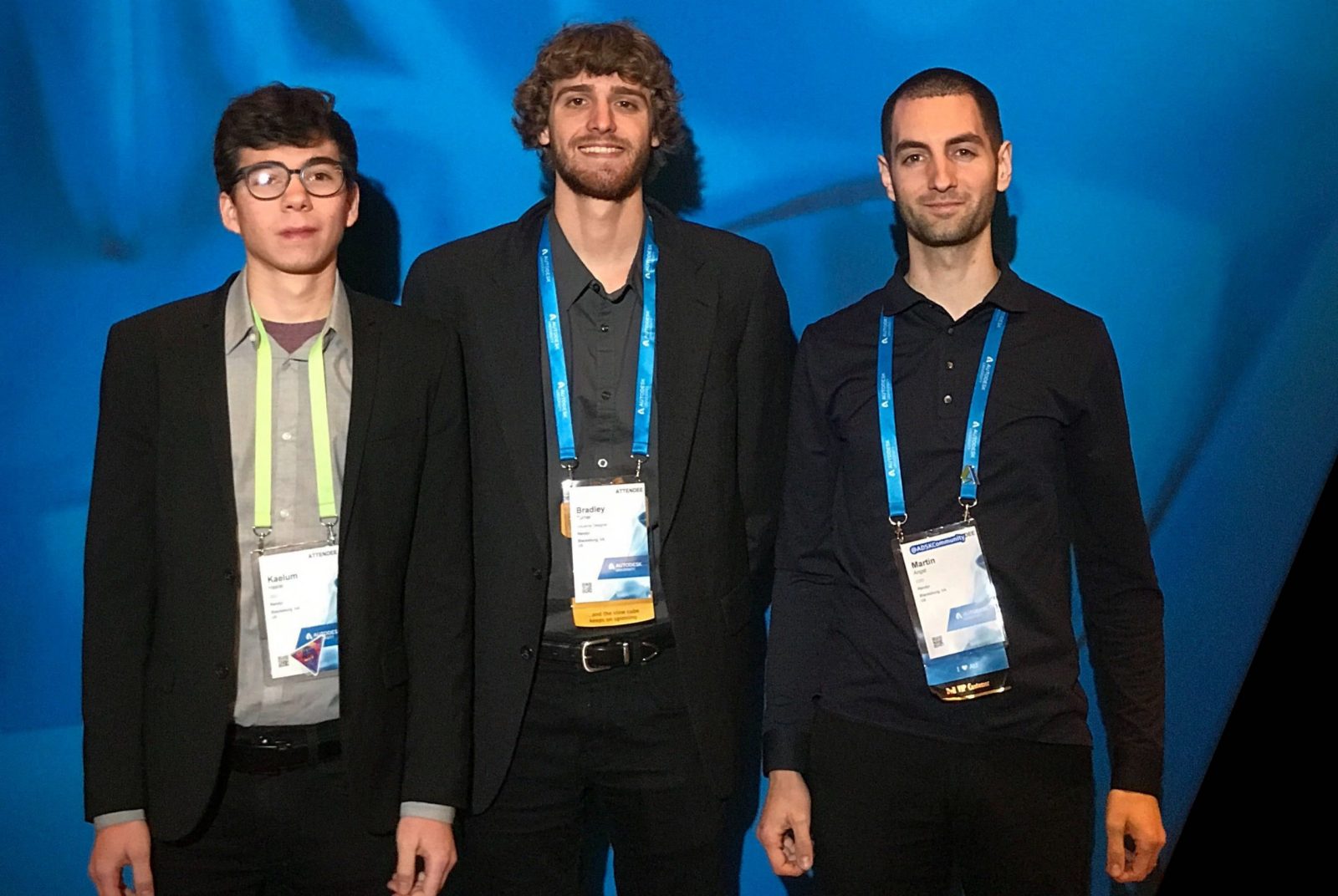
GAME-CHANGER: Members of the Rendyr team, from left to right, Kaelum Hasler, Bradley Turner, and Martin Angst.
A team from the College of Architecture and Urban Studies was one of only four student groups in the world to showcase their emerging desktop robotics company, Rendyr, at last fall’s Autodesk University Conference Student Expo in Las Vegas.
The event showcased the latest technologies and tools that are changing the world and the entrepreneurs who created them.
Martin Angst, a student working toward a master’s degree in architecture, and Kaelum Hasler, a junior majoring in industrial design, are co-founders of Rendyr, which is developing a “laptop version” of an industrial laser cutter to improve access to rapid prototyping and digital fabrication.
Designed to support creative environments that do not have the space or the budget to accommodate conventional fabrication machines, its portability makes it convenient for a variety of settings and allows for easy sharing within groups of people. Hasler developed a prototype, with support from the Institute for Creativity, Arts, and Technology at Virginia Tech. A second prototype won the Virginia Tech Game Changers Challenge and helped Hasler and Angst incorporate as Rendyr Inc. in 2018.
Virginia Tech students from a variety of academic disciplines, including industrial design, architecture, and engineering, are currently working at Rendyr.
WVTF RADIO IQ ENHANCES COVERAGE
WVTF RADIO IQ ENHANCES COVERAGE

WVTF Radio IQ acquired the 89.7 FM frequency in October 2019, a move that expands its growing reach in Virginia. This additional frequency covers the entire Richmond metropolitan area with a robust signal of 20,000+ watts. The acquisition aligns with WVTF’s statewide approach to covering Virginia. WVTF Radio IQ now extends from Wise, Virginia, in the southwestern part of the state, north to Spotsylvania, and east nearly to Williamsburg.
The Virginia Tech Foundation has operated WVTF, the managing station for Virginia Public Radio, since the early 1980s.
STUDENTS HAVE A VOICE IN INNOVATION CAMPUS PLANS
STUDENTS HAVE A VOICE IN INNOVATION CAMPUS PLANS
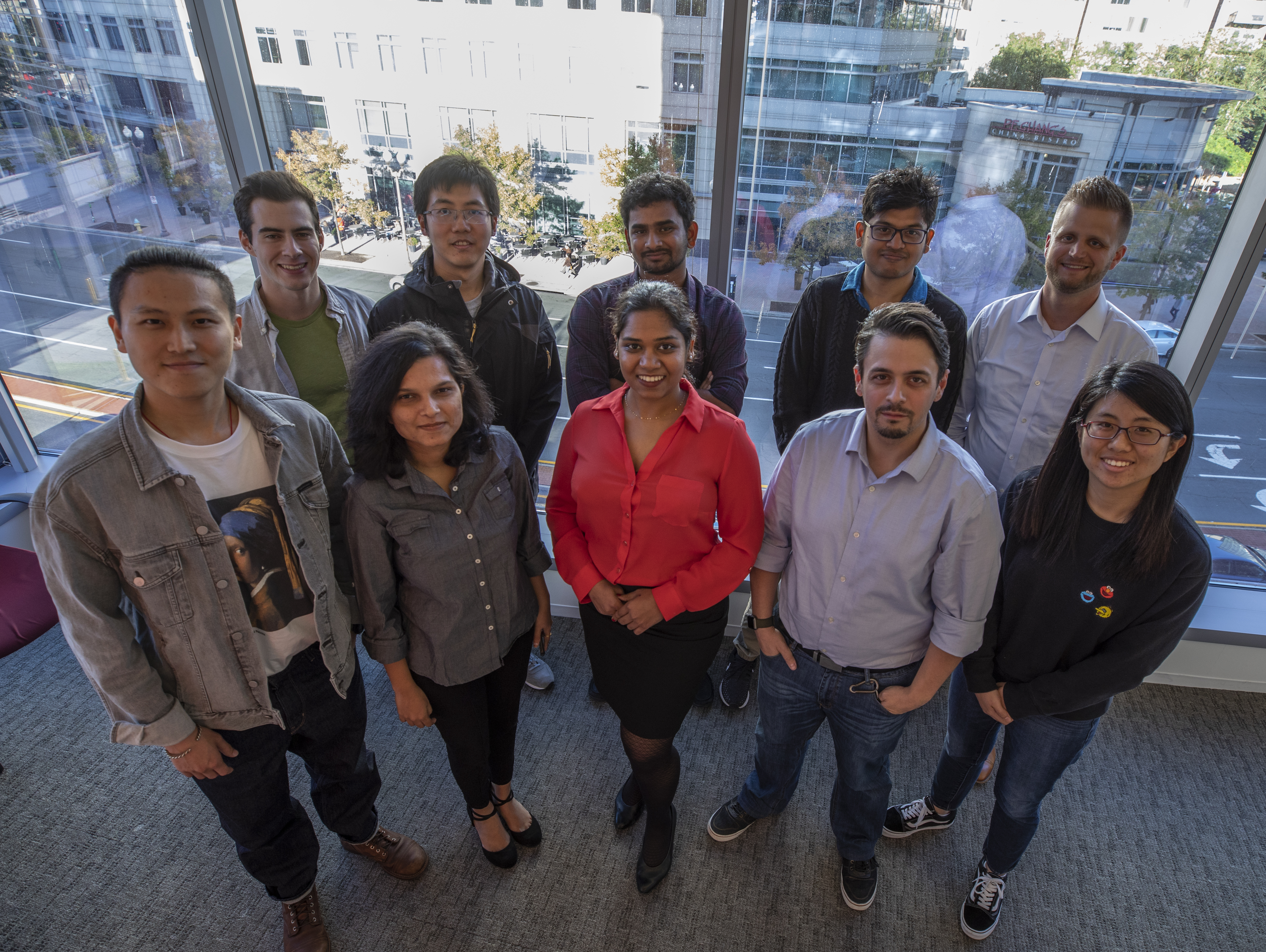
INNOVATION FELLOWS: (back row) Logan Eisenbeiser, Xin Chen, Goprikrishna Rathinavel, Padmaksha Roy, and Christopher White. (front row) Yiqing Liu, Pooja Algikar, Sneharaj Ramdaspalli, Ronald “Angel” Cox, and Yu-Hsuan Huang.
Fresh off of four years in Blacksburg earning a bachelor’s degree in computer engineering at Virginia Tech, Logan Eisenbeiser moved to Northern Virginia last year to pursue his master’s of computer engineering at the university’s Falls Church campus.
Little did he know that he would be helping to set the stage for future Hokies who also will study in Northern Virginia at Virginia Tech’s future Innovation Campus.
The Innovation Campus delivery team wanted input from the real experts—students—and Eisenbeiser is one of 10 graduate students selected as an Innovation Fellow. For the next year, the fellows will offer input, share perspectives, act as advisors, and participate in events as plans for the Innovation Campus move forward and classes begin.
“It’s a really cool project, and it’s a really exciting time,” said Eisenbeiser, who also is a graduate research assistant at the Hume Center in Arlington.
The fellows, who all are pursuing masters or doctoral degrees in computer science, computer engineering, electrical and computer engineering, or business information technology, were chosen from more than two dozen applicants for the program. They are enrolled in existing Virginia Tech programs in Northern Virginia.
“With their fresh ideas and feedback, we will create a better educational experience for future Innovation Campus students,” said Brandy Salmon, founding managing director for the campus.
EIGHT WEEKS WITH WILDLIFE IN BOTSWANA
EIGHT WEEKS WITH WILDLIFE IN BOTSWANA
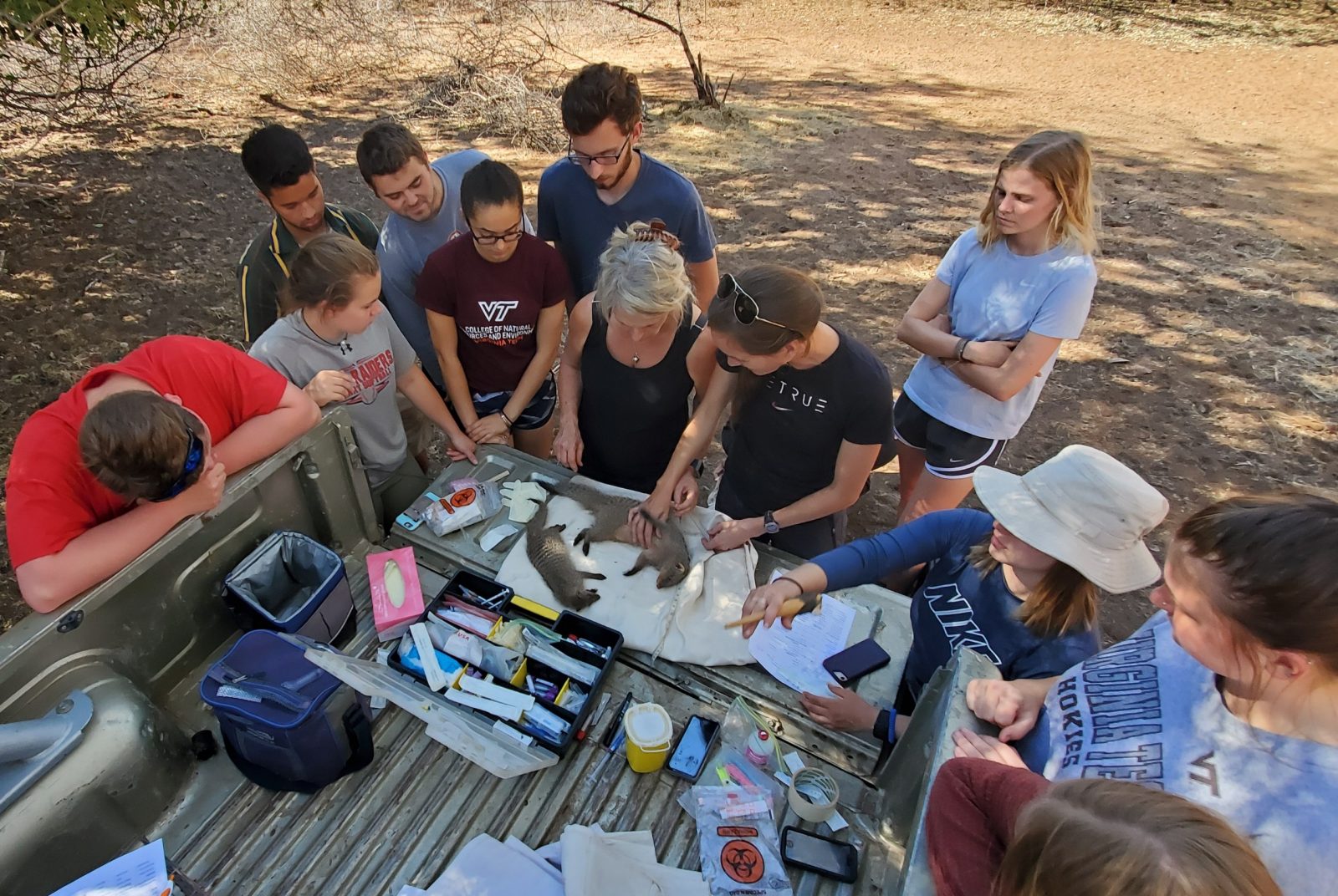
AFRICAN IMMERSION: Professor Kathleen Alexander and her colleague Lena Patiño (center), both veterinarians, assess the health of two banded mongooses as part of their ongoing research.
For Kayla East, studying wildlife health in northern Botswana meant having to get used to the unexpected.
“I remember, on a day off, a group of us were approached at our hotel by someone from the village who told us that a baby monkey had been injured and asked for our help,” said East, a junior wildlife conservation major. “Very soon I found myself running through a fancy hotel with a baby monkey cradled in my arms, trying to figure out how to transport it to the wildlife lab. That was the moment I realized that there is no such thing as mundane in Botswana, no such thing as the expected.”
East was among 15 Virginia Tech undergraduates who traveled to Botswana in summer 2019 to participate in a College of Natural Resources and Environment field course, Wildlife Health Immersion in Africa: Capture, Rehabilitation, and Forensics.
“This summer course was designed to have a specific focus,” said Professor Kathleen Alexander of the Department of Fish and Wildlife Conservation and an affiliate of the Fralin Life Sciences Institute. “We didn’t want students to travel somewhere to see other people do the work; we wanted them to be responsible in having to navigate difficult, cross-disciplinary environments, to engage with wildlife while understanding the human dimensions of that interaction.”
On location at the Centre for African Resources, Animals, Communities, and Land Use (CARACAL) near Chobe National Park, Alexander’s immersive eight-week course focused on training students on the many facets of wildlife work in sub-Saharan Africa. They participated in a rotation of tasks intended to mirror the center’s range of work, including animal husbandry and care for raptors and mammals, introduction to laboratory techniques, public health and data handling, and wildlife ecology, capture, and rescue. For more information about the students’ experiences, visit cnre.vt.edu/about/newsmagazine/articles/fall-2019/eight-weeks-in-botswana.
Newsreel
Virginia Tech videographers have been hard at work capturing the university’s news and events. Watch these videos and many others at video.vt.edu.
HOKIES HELP COOPER'S HAWK SPREAD ITS WINGS AND FLY
HOKIES HELP COOPER'S HAWK SPREAD ITS WINGS AND FLY
A Cooper’s hawk is flying free thanks to Hokies and the Southwest Virginia Wildlife Center. The hawk flew into a window and then spiraled to the ground at the Alphin Stuart Livestock Arena. Less than a week later, the hawk was released into the wild.
EXPLOSIVE RESEARCH IS PROTECTING PEOPLE AND INFRASTRUCTURE
EXPLOSIVE RESEARCH IS PROTECTING PEOPLE AND INFRASTRUCTURE
Eric Jacques, an assistant professor in the College of Engineering, is using a shock tube to research the effects of blasts on structures, be it a terrorist attack or an accidental explosion.
HOKIEBIRD MEETS PRESIDENTIAL TURKEYS
HOKIEBIRD MEETS PRESIDENTIAL TURKEYS
Just before Thanksgiving, HokieBird met the Presidential Turkeys in Washington, D.C., before their debut at the White House. Afterward, the turkeys headed to their new home at Gobblers Rest on Virginia Tech’s Blacksburg campus.
ARCHITECTURE STUDENTS DESIGN, BUILD NEW RIVER TRAIN OBSERVATORY
ARCHITECTURE STUDENTS DESIGN, BUILD NEW RIVER TRAIN OBSERVATORY
A cross-disciplinary team of faculty and students designed and built the New River Train Observatory in Radford, a unique structure offering dramatic views of the railway line.
